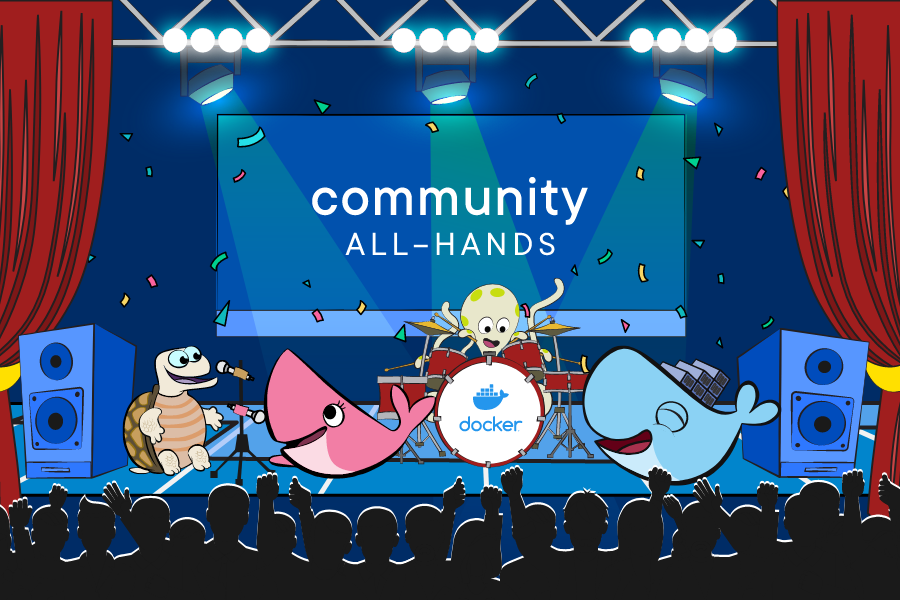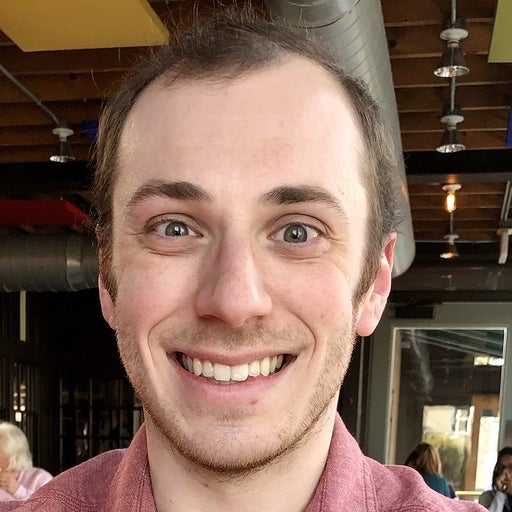
That’s a wrap! Community All-Hands has officially come to a close. Our sixth All-Hands featured over 35 talks across 10 channels — with topics ranging from “getting started with Docker” to running machine learning on AI hardware accelerators.
As always, every channel was buzzing with activity. Your willingness to jump in, ask questions, and help others is what the Docker community’s all about. And we loved having the chance to chat with everyone directly!
Couldn’t attend our recent Community All-Hands event? We’ll cover some important announcements, interesting presentations, and more that you missed.
Docker CPO looks back at a year of developer obsession
Headlining Community All-Hands were some important announcements on the main stage, kicked off by Jake Levirne, our Head of Products. This past year, our engineers focused on improving developer experiences across every product. Integrated features like Dev Environments, Docker Extensions, SBOM, and Compose V2 have helped streamline workflows — along with numerous usability and OS-specific improvements.
Over the last year, the Docker engineering team:
- Released 24 new features
- Made 37,000 internal commits
- Curated 52 extensions and counting within Docker Desktop and Docker Hub
- Hosted over eight million Docker Desktop downloads
We couldn’t have made these improvements without your feedback. Keep your votes, comments, and messages coming — they’re essential for helping us ship the features you need. Keep an eye out for continued updates about UX enhancements, Trusted Open Source, and user-centric partnerships.
How to use SBOMs to support multiple layers
Following Jake, our presenters dove deeper into the technical depths. Next up was a session on viewing images through layered software bills of materials (SBOMs), led by Docker Principal Software Engineer Jim Clark.
SBOMs are extremely helpful for knowing what’s in your images and apps. But where it gets complex is that many images stem from base images. And even those base images can have their own base images, making full image transparency difficult. Multi-layer images have historically been harder to analyze. To get a full picture of a multi-layer image, you’ll need to know things like:
- Which packages are included
- How those packages are distributed between layers
- How image rebuilds can impact packages
- If security fixes are available for individual packages
Jim shared that it’s now possible to gather this information. While this feature is still under development, users will soon see layer sizes, total packages per layer, and be able to view complete Dockerfiles on GitHub.
And as a next step, the team is also focused on understanding shared content and tracking public data. This is another step toward building developer trust, and knowing exactly what’s going into your projects.
Docker Desktop meets multi-platform image support via containerd
Rounding out our major announcements was Djordje Lukic, Staff Software Engineer, with a session on containerd image management. Containerd has been our container runtime since 2016. Since then, we’re extended its integration within Docker Desktop and Docker Engine.
Containerd migration offers some key benefits:
- There’s less code to maintain
- We can ship features more rapidly and shorten release cycles
- It’s easier to improve our developer tooling
- We can bring multi-platform support to Docker, while following the Open Container Initiative (OCI) more closely and supporting different snapshotters.
Leveraging containerd more heavily means we can consolidate portions of the Docker Daemon. Check out our containerd announcement blog to learn more.
Showcasing attendees’ favorite talks
Every Community All-Hands channel hosted unique sets of topics, while each session highlighted relationships between Docker and today’s top technologies. Here are some popular talks from Community All-Hands and why they’re worth watching.
Developing Go Apps with Docker
From the “Best Practices” channel.
Go (or Golang) is a language well-loved and highly sought after by professional developers. We support it as a core language and maintain a Go language-specific use guide within our docs.
Follow along with Muhammad Quanit as he explores containerized Go applications. Muhammad covers best practices, the importance of multi-stage builds, and other tips for optimizing your Dockerfiles. By using a Go web server, he demonstrates the “Dockerization” process and the usefulness of IDE extensions.
Integration Testing Your Legacy Java Microservice with docker-maven-plugin
From the “Demos” channel.
Enterprises and development teams often maintain Java code bases upwards of 10 years old. While these services may still be functional, it’s been challenging to bind automated testing to each individual microservice repository. Docker Compose does enable batch testing, but that extra granularity is needed.
Join Terry Brady as he shows you how to run JUnit microservices tests, automated maven testing, code coverage calculation, and even test-resource management. Don’t worry about rewriting your legacy code. Instead, learn how integration testing and dedicated test containers help make life easier.
How Does Docker Run Machine Learning on Specialized AI Hardware Accelerators
From the “Cutting Edge” channel.
Currently, 35% of companies report using AI in some fashion, while another 42% of respondents say they’re considering it. Machine learning (ML) — a subset of AI — has been critical to creating predictive models, extracting value from big data, and automating many tedious processes.
Shashank Prasanna outlines just how important specialized hardware is to powering these algorithms. And while ML gains steam, companies are unveiling numerous supporting chipsets and GPUs. How does Docker handle these accelerators? Follow along as Shashank highlights Docker’s capabilities within multi-processor systems, and how these differ from traditional, single-CPU systems from an AI standpoint.
But wait, there’s more!
The above talks are just a small sample of our learning sessions. Swing by our Docker YouTube channel to browse through our entire content library.
You can also check out playlists from each event channel:
- Mainstage – showcases of the community and Docker’s latest developments
- Best Practices – tips to get the most from your Docker applications
- Demos – in-depth presentations that tackle unique use cases, step by step
- Security – best practices for building stronger, attack-resistant containers and applications
- Extensions – the basics of building extensions while demonstrating their usefulness in different scenarios
- Cutting Edge – talks about how Docker and today’s leading technologies unite
- International Waters – multilingual tech talks and panel discussions on trends
- Open Source – panels on the Docker Sponsored Open-Source Program and the value of open source
- Unconference – informal talks on getting started with Docker and Docker experiences
Thank you and see you next time!
From key Docker announcements, to technical talks, to our buzzworthy Community Awards ceremony, we had an absolute blast with you at Community All-Hands. Also, a huge special thanks to DJ Alessandro Vozza for keeping the music and excitement going!
And don’t forget to download the latest Docker Desktop to check out the releases and try out any new tricks you’ve learned.
See you at our next All-Hands event, and thank you for making this community stronger. Happy developing!
